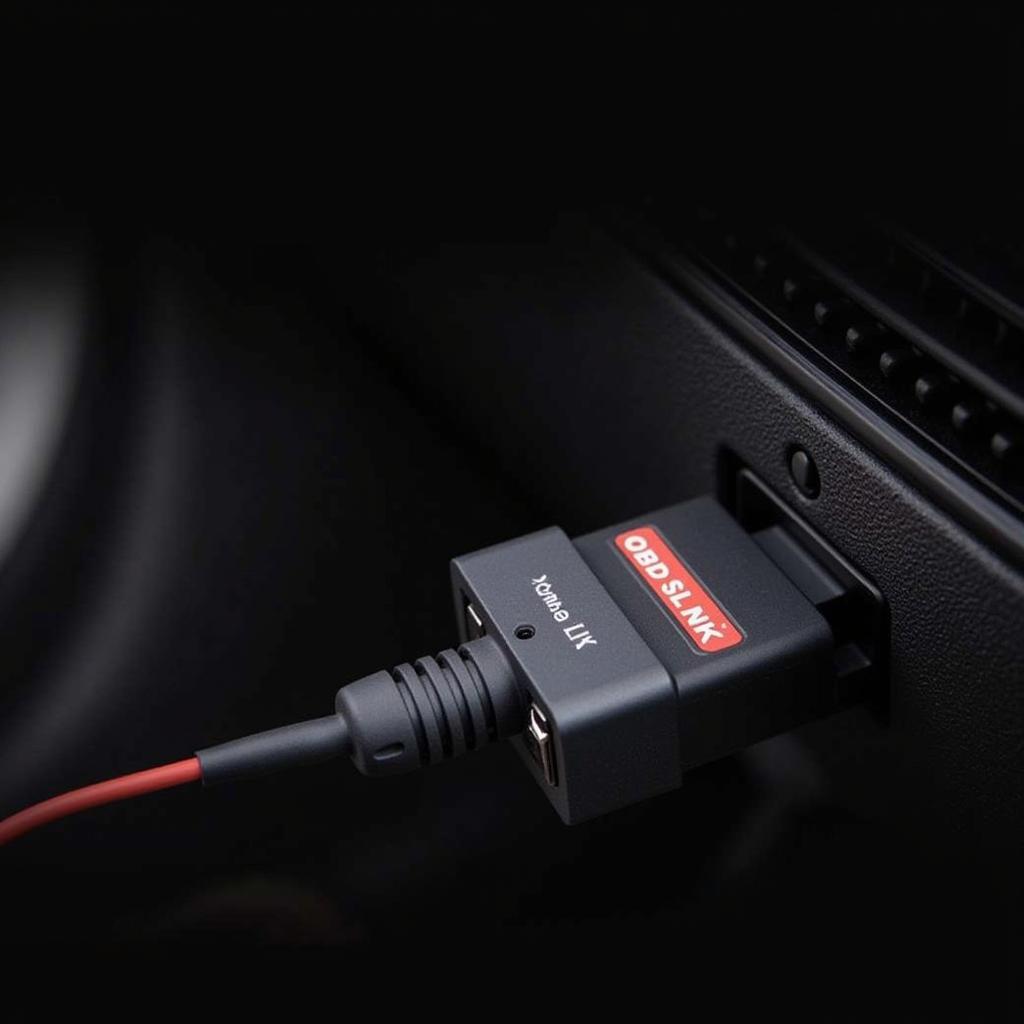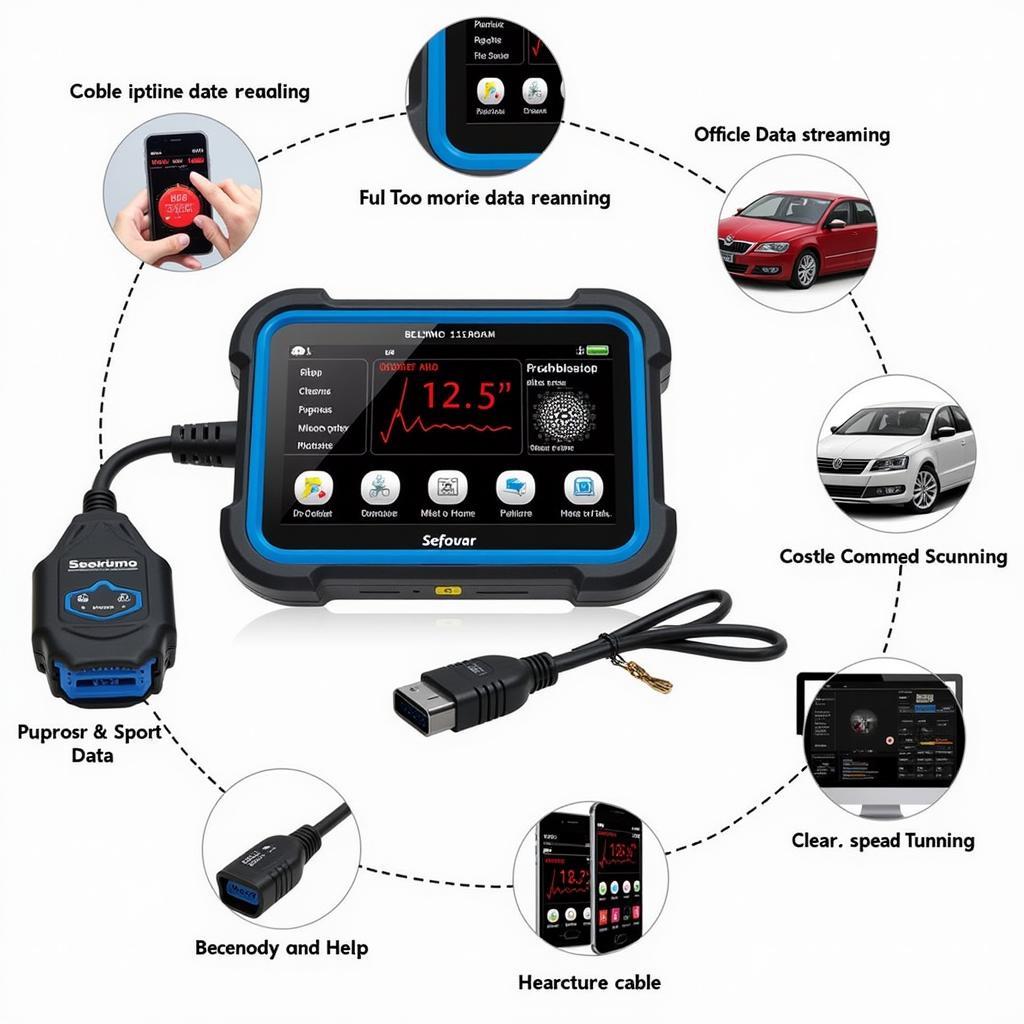In today’s tech-driven world, even car troubles are becoming increasingly digital. Gone are the days of relying solely on a mechanic’s intuition; car scanner diagnostic tools have revolutionized the way we understand and fix our vehicles. These powerful devices provide a window into your car’s computer system, offering a wealth of information about its performance and any potential issues.
[image-1|car-scanner-diagnostic-tool-connected-to-car|Car Scanner Diagnostic Tool Connected to Car|A close-up image of a car scanner diagnostic tool being plugged into a car’s OBD-II port, located under the dashboard. The tool’s screen displays diagnostic data and information about the vehicle’s systems.]
What is a Car Scanner Diagnostic Tool?
At its core, a car scanner diagnostic tool is a device that connects to your car’s On-Board Diagnostics (OBD) system, typically through the OBD-II port found in most vehicles manufactured after 1996. This port acts as a gateway to your car’s computer, allowing the scanner to access and interpret data from various sensors and systems.
Why Are Car Scanner Diagnostic Tools Important?
Imagine this: your check engine light turns on, leaving you both worried and clueless about the cause. In the past, this meant a trip to the mechanic, hoping for a swift and accurate diagnosis. With a car scanner diagnostic tool at your disposal, you can immediately identify the problem.
[image-2|mechanic-using-a-car-scanner-diagnostic-tool|Mechanic Using a Car Scanner Diagnostic Tool|A mechanic in a repair shop is shown using a professional-grade car scanner diagnostic tool to diagnose a problem with a car. The tool’s large screen displays detailed diagnostic information, and the mechanic is analyzing the data to determine the root cause of the issue.]
These tools empower car owners and mechanics alike by:
- Pinpointing Issues: No more guessing games! Get specific diagnostic trouble codes (DTCs) that pinpoint the source of the problem.
- Saving Time and Money: Detect issues early, potentially preventing costly repairs down the line.
- Empowering DIYers: Equip yourself with the knowledge to understand and potentially fix minor issues yourself.
- Enhanced Understanding: Gain insights into your car’s performance beyond just the check engine light.
Types of Car Scanner Diagnostic Tools
Choosing the right car scanner can be daunting, given the wide array of options available. Here’s a breakdown:
1. Basic Code Readers:
These entry-level scanners are budget-friendly and perfect for reading and clearing basic DTCs. However, they may not provide detailed information or advanced functionalities.
2. OBD2 Scanners:
Scan tool diagnosis offer a step up from basic code readers, providing more comprehensive data, including live sensor readings, freeze frame data (a snapshot of the vehicle’s systems at the time a fault occurred), and the ability to view multiple parameters simultaneously.
3. Professional-Grade Scanners:
As the name suggests, these are the tools of choice for mechanics and experienced DIY enthusiasts. They offer advanced functionalities like bi-directional communication with the vehicle’s systems (allowing for certain component activations and tests), coding and programming capabilities, and access to manufacturer-specific data.
[image-3|different-types-of-car-scanner-diagnostic-tools|Different Types of Car Scanner Diagnostic Tools|A side-by-side comparison of a basic code reader, an OBD2 scanner, and a professional-grade scanner. Each tool is labeled with its key features and functionalities.]
Choosing the Right Scanner for You
The best scanner for you depends on your needs and technical expertise:
- Casual Car Owner: A basic code reader or a reliable OBD2 scanner will suffice for checking engine lights and monitoring basic parameters.
- DIY Enthusiast: Consider an OBD2 scanner with live data capabilities and some advanced features to delve deeper into your car’s systems.
- Professional Mechanic: Professional-grade scanners with their comprehensive functionalities and manufacturer-specific data are a must-have.
Beyond the Basics: Advanced Features to Consider
When exploring various car scanner diagnostic tools, look for these value-added features:
- Live Data Streaming: Monitor real-time sensor data to analyze performance and diagnose intermittent issues.
- ABS, SRS, and Transmission Diagnostics: Go beyond engine diagnostics and access data from critical systems like Anti-lock Brakes (ABS), Supplemental Restraint System (SRS), and Transmission.
- Bi-Directional Control: This allows you to activate certain components, like turning on the fuel pump for testing, providing a deeper level of diagnostic capability.
- Wireless Connectivity: Opt for Bluetooth or Wi-Fi enabled scanners for seamless data transfer and remote viewing on your smartphone or tablet.
[image-4|car-scanner-diagnostic-tool-displaying-data-on-smartphone|Car Scanner Diagnostic Tool Displaying Data on Smartphone|A smartphone is shown displaying live data and diagnostic information from a wireless car scanner diagnostic tool. The smartphone app provides a user-friendly interface for monitoring vehicle parameters and accessing diagnostic features.]
Using a Car Scanner Diagnostic Tool: A Step-by-Step Guide
Using a car scanner is simpler than you might think. Here’s a basic guide:
- Locate Your OBD-II Port: It’s usually under the dashboard on the driver’s side.
- Connect the Scanner: Plug the scanner into the port and turn on your ignition (engine off).
- Turn on the Scanner: Follow the on-screen prompts to establish a connection.
- Read and Clear Codes: Select “Read Codes” to retrieve DTCs. After addressing the issue, use the “Clear Codes” function to reset the check engine light.
Remember, the exact steps may vary depending on the scanner model. Always consult your user manual for specific instructions.
Car Scanner Diagnostic Tools: Essential for Modern Car Maintenance
Just as technology has become integral to our lives, it’s also shaping the future of car maintenance. Scan tool for subaru and dodge are no longer just tools for mechanics; they are empowering tools for every car owner. Whether you want to diagnose a simple check engine light, delve deeper into your car’s performance, or simply stay ahead of potential issues, investing in a car scanner diagnostic tool is a wise decision for any car owner.
For expert advice on choosing the right car scanner diagnostic tool or for any automotive diagnostic needs, contact the professionals at ScanToolUS at +1 (641) 206-8880 or visit our office at 1615 S Laramie Ave, Cicero, IL 60804, USA.
FAQs About Car Scanner Diagnostic Tools
1. Can I use any car scanner on any car?
While most scanners are compatible with the standard OBD-II port, some vehicles may require manufacturer-specific tools.
2. Will using a car scanner void my car’s warranty?
No, using a car scanner will not void your warranty. It simply allows you to read data from your car’s computer.
3. Can I fix any problem identified by a car scanner myself?
While scanners can pinpoint issues, it’s crucial to understand the problem and your limitations before attempting any repairs.
4. What are some common car problems a scanner can diagnose?
Car scanners can help diagnose a wide array of problems, from engine misfires and oxygen sensor issues to using obd2 scan tool testing oxygen sensor and more.
5. How often should I use a car scanner?
It’s recommended to scan your car periodically, especially if you notice any unusual performance issues or warning lights.



Pingback: Understanding Car Code Scanner SRS: A Comprehensive Guide - Car Scan Tool